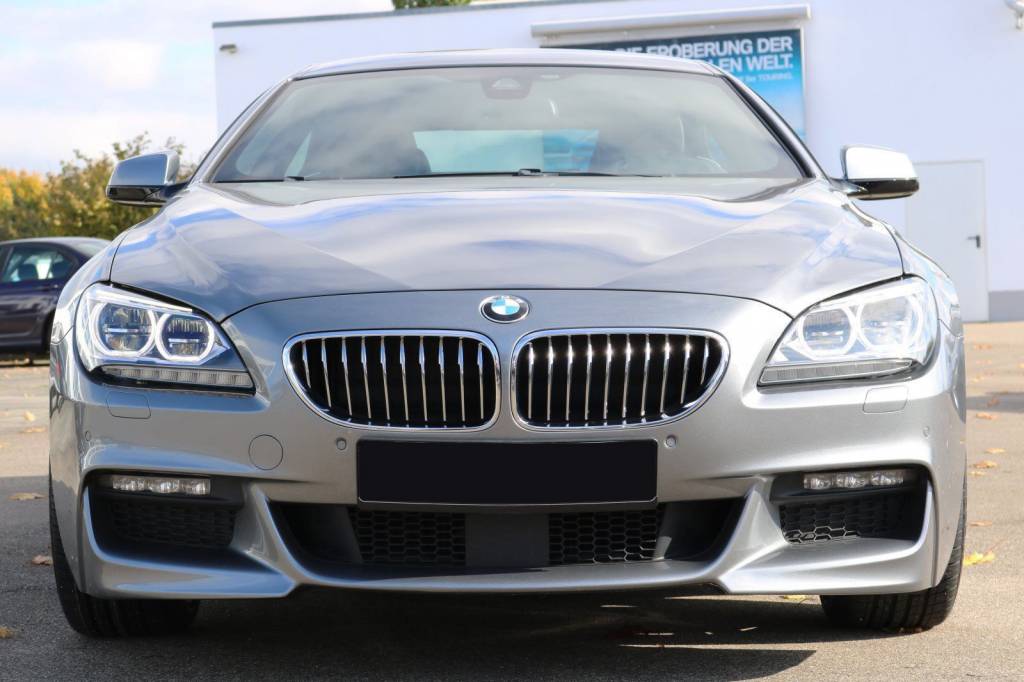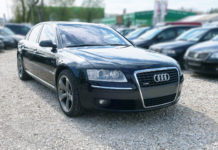Petrol engines

640i
The most reliable petrol engine is the turbocharged straight 6 cylinder N55 unit. Of course it doesn’t have the sound of the V8 and it doesn’t have the power of the V8 but it is generally speaking a lot more reliable than the V8. On the other side, it can have issues mainly with the oil and coolant leaks, injectors, occasionally with the high pressure fuel pump, faulty water pump, Vanos related issues-solenoids + adjustment sprockets, or valvetronic related problems, but still, could be worse.
650i
Then there is the infamous twin-turbo 4.4 l V8 which has a big amount of power and much better sound then the 6 cylinder, there is no doubt about that. But you should definitely avoid this engine in cars made to 2012, since it can have numerous issues related to:
- turbochargers
- oil or coolant leaks
- mysterious misfires
- heavy oil consumption
- timing chain
- and complete engine failures are not uncommon either sometimes even after 50 000 km / 31 000 mi ! (lots of these engines were replaced under warranty)
On the other side BMW updated this engine in cars made from 2013, which means that it is more reliable from this year. But don’t expect bulletproof reliability even from the updated version, since it’s still almost the same overcomplicated engine which will have various (not cheap) issues, but mostly only in higher mileage cars. In other words, this modified V8 from 2013 can withstand 200 000 km / 124 000 mi with the proper maintenance, but I would not recommend buying this engine after this mileage point, because after this the chance of failures and expensive repair bills noticeably increases.
You should keep in mind that these are very complex engines indeed and sometimes they consume smaller or bigger amount of oil, so it’s really important to maintain the correct oil level all the time. All in all, check the oil level regularly, and also change it after 8 000 km – with this oil change interval you can minimize some of the issues. Obviously, the high pressure fuel pumps or the injectors can fail in this V8 as well – causing misfires.
“Use only the best possible oil and fuel in these engines!”
M6
The engine in the M6 version is that reliable as the modified V8 from 2013, but since it’s a high performance car, some owners simply abused it-and in that case it can have bigger oil consumption or other issues.
By the way, sometimes you won’t get the regular low oil level warning even if the oil level is lower than it should be. Because of this you have to check the oil level through the iDrive regularly!
Diesel engines

640d
This BMW was available with only 1 diesel engine. The N57 straight 6 cylinder with two turbochargers. It is powerful enough and it is very economical too! So its all great and awesome, but only when it is working properly or it won’t catch fire…
Obviously if it was abused, used regularly only on short distances or it has more than 200 000 km then you can expect all the issues of the World. But even if you will use the car mainly on longer journeys, change the oil after MAX 10 000 km, and use high quality oil + fuel, even then when doing all this, the possibility of the more or less expensive problems is not gonna disappear.
EGR system issues

First of all there is the EGR system. The EGR valve itself can fail/or get stuck causing: uneven idle, engine stalling, increased fuel consumption, loss of power/limp mode, slight jerking during acceleration and EGR related fault codes. But this is not the big problem.
The bigger problem is the EGR cooler which can leak coolant internally. In this case the coolant will mix with the carbon deposits and this mixed stuff can catch fire !! The only good thing is, that there was and maybe even still is a recall related to this EGR cooler – so in many cases the dealer already replaced the EGR cooler assembly. And maybe they will replace it for free even today. The bad thing is, that the dealer is not gonna replace the EGR cooler for free forever and there is a possibility that even the new cooler starts to leak. This is why many owners decided to deactivate the EGR system – if this is a good or bad idea that’s a topic for another discussion.
All in all, make sure that the EGR cooler was replaced under this recall. If not, then:
- ask the dealer about this ASAP
- check the inside of the EGR cooler with an endoscopic camera for coolant leaks
- monitor the coolant level (if it drops without external leaks then the cooler can already leak
- clean the EGR, EGR cooler and intake manifold from carbon deposits every 100 000 km
Check also for strange vibrations from the engine at idle since there were cases of prematurely worn engine mounts.
Fuel system issues
1. HPFP failure
All of these engines are equipped with the infamous Bosch CP4 HPFP which can suddenly fail and release tiny metal particles into the whole fuel system – this is gonna destroy all the injectors.
However, this issue is not extremely common and it happens usually just in the eastern part of Europe and in the US because of the different quality of the fuel.

The HPFP can fail before 200 000 km, occasionally even before 150 000 km.
If the HPFP fails then the injectors will immediately fail too – so besides the HPFP you have to replace those as well + the whole fuel system has to be cleaned too. Fixing this costs around $12 000 at the dealer. An independent mechanic will be able to fix this for a lower price – under $4 000 – 5 000. In the Western EU countries on the other hand the failure it not common, so with good quality fuel the HPFP can easily withstand even more than 186 000 mi / 300 000 km.
2. Injectors
Then there are the injectors which can fail mostly after 200 000 – 250 000 km. Usually you only get the classic faulty injector symptoms, but in the worst case – so not that often, the faulty injector can melt the piston or crack it. Especially cars with performance upgrades can more often end up with this kind of a major damage. By the way a faulty injector can also cause a louder rattling noise.
What about cars with this diesel engine with more than 200 000 – 250 000 km?
If you are buying this BMW with a diesel engine which has more than 200 000 – 250 000 km, then it’s also better to be ready for:
- worn turbochargers
- oil & coolant leaks
- worn rod bearings or worn main crankshaft bearings (mostly at or after 300 000 km, but sometimes even earlier). The first early sign of worn bearings are gonna be metallic chips in the oil filter, later they will spun causing a knocking noise from the engine, and even later you will end up with a destroyed engine
So don’t buy a diesel engine with more than 200 000 – 250 000 km unless you have enough money to replace/repair the whole engine, eventually replace the rod+main bearings preventively !

Timing chain
All of the engines are equipped with timing chain. At around 200 000 km / 124 000 mi it can be worn so you should be ready to replace it (and its actually good to replace it preventively). On the other side, in the 6 cylinder N55 petrol engine the chain can usually last at least 200 000 km and in many cases easily even more than 250 000 km.
But either way, pay attention to worn timing chain symptoms regularly and consider replacing the chain preventively, mainly if you have the N57 diesel engine or the infamous V8 N63 petrol engine.
The worn chain on the petrol engines usually just jumps, on the diesel engine on the other side it can even break/snap!
On a petrol engine when the chain jumps just slightly you will experience: check engine light, loss of power, limp mode, bad/long engine start, uneven engine running/misfires. In this case the engine is most probably not damaged, so it’s enough to replace the chain mechanism. However, if you are unlucky and the chain jumps more, then you can also end up with a damaged engine – bent valves – and in this case the repair is gonna be much more expensive.
Early symptoms of a worn timing chain: rattling / whining noises from engine constantly, or just a rattle at start up which will disappear after a while.
Transmissions
This BMW is equipped with just the 8 speed automatic gearbox, and the M6 version had either the common 7 speed dual-clutch transmission or the not that common 6 speed manual.
There are no extraordinary issues with these transmissions, at least in cars with less than 200 000 km, so just check them properly before buying and change the oil in them!
xDrive 4WD
In cars equipped with the xDrive 4 wheel drive system you should check for all those strange howling or whining sounds and also for shuddering at acceleration which can indicate issues with the transfer case – since there are many cases of failed transfer cases mostly after approximately 100 000 km / 62 000 mi.
The abused M6 version can have issues with the worn rear differential but that’s nothing unusual.
It’s also good to check for strange vibrations from 100 km/h – 62 mph at constant speed or during acceleration. Some say it’s because of the unbalanced wheels, some say it’s the gearbox, or the brake discs and pads, and some unlucky owners just sold the car because of this annoying possible problem.
The last thing you should check is a strange occasional tapping / knocking noise or feel in the steering wheel when coming to a stop or moving slowly – this is not normal, and owners who experienced this got a new steering rack under warranty!
To summarize things up:
- if you want the most reliable version and you want to keep the car for a longer time then choose the 640i 6 cylinder petrol model
- avoid cars with performance upgrades
- buy only a car with a proper maintenance history
- definitely keep extra money for the additional repairs if you are buying a car outside of warranty!
As usual, if you have personal experience with this car or more information about it, then you can write it into comments!














very nice
[…] https://differentcarreview.com/2019/02/16/bmw-6-series-f06-f12-f13/ Buying a used BMW 6 series (F06, F12, F13) – produced from 2011-2018 […]